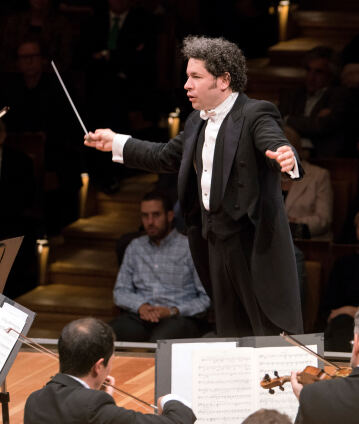Gustavo Dudamel conducts Beethoven, Schubert and Stravinsky

Gustavo Dudamel is acclaimed all over the world as a spirited conductor of passionate music, and in this concert too, he shows himself to be the ideal interpreter of Igor Stravinsky’s fiery and vibrant Suites Nos. 1 and 2. The fact that he is now also a master of the fine shading required for the music of the First Viennese School can be heard in his astutely balanced performance of the fourth symphonies of Ludwig van Beethoven and Franz Schubert.
Gustavo Dudamel has two completely contrasting role models: “Herbert von Karajan because of his discipline. And Leonard Bernstein – a man who took risks and was full of emotion.” The charismatic Venezuelan is now known around the world for precision and emotional expression – a thoroughbred musician who is praised to the skies by his mentors Claudio Abbado, Daniel Barenboim and Simon Rattle – “the most talented and fascinating conductor I know,” says Sir Simon.
In addition to Igor Stravinsky’s Suites No. 1 and No. 2 with “Valse”, “Polka” and “Galop”, Gustavo Dudamel conducts two symphonies at his guest performance with the Berliner Philharmoniker: Franz Schubert’s Fourth in C minor D 417, in which the composer, by returning to Haydnesque models, consciously wanted to distance himself from Beethoven’s symphonic works, in which the slow middle movement unfurls an unending flow of melody in song-like cantabile, a typical moment in Schubertian composition.
The concert concludes with Beethoven’s Fourth Symphony in B flat major op. 60, which in Robert Schumann’s words appears like a “svelte Greek maid between two Nordic giants” (the Symphonies Three and Five), whereas “Greek” may stand in the first instance for “classical”, thus “in keeping with the known form”, which is by all means the case here. The attribute “svelte” also appropriately describes this music because the work makes use of fewer voices than all other Beethoven symphonies and deploys the woodwind instruments in a truly intimate manner reminiscent of chamber music.
© 2013 Berlin Phil Media GmbH
Related interviews
Artists
Our recommendations
- Gustavo Dudamel conducts Mahler’s Fifth Symphony
- Gustavo Dudamel conducts Shostakovich’s Symphony No. 12
- Gustavo Dudamel with Mahler’s Fifth Symphony
- Gustavo Dudamel conducts Mahler’s Third Symphony
- Europakonzert 2012 from Vienna with Gustavo Dudamel and Gautier Capuçon
- Gustavo Dudamel conducts Tchaikovsky and Brahms at the Waldbühne